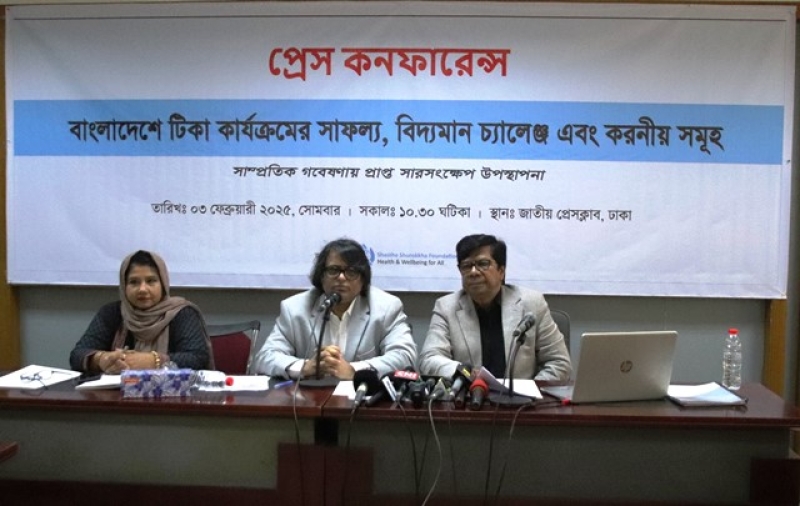- Power generation at Payra Thermal Power Plant 1st unit starts after a month |
- Irregularities, injustice will no longer be accepted in politics: Jamaat Ameer |
- 2 arrested in Jhenaidah for allegedly selling madrasa student |
- Koko’s wife campaigns for Tarique in Dhaka-17 |
- Bangladeshi Expats Cast 4.58 Lakh Postal Votes |
Successes, Challenges, & Future Actions of EPI Program in BD
Presentation of Research Findings

Success of vaccination programme in Bangladesh, press conference Jan 3 2025,
On Monday, February 3, 2025, at 10:30 AM, a press conference was held at the Tofazzal Hossain Manik Mia Hall of the National Press Club. The event was jointly organized by Shastho Shurokkha Foundation and UNICEF Bangladesh to present the findings of a research study titled "Successes, Existing Challenges, and Future Actions of the Vaccination Program in Bangladesh."
Under the joint initiative of Shastho Shurokkha Foundation and UNICEF Bangladesh, and with the support of the Expanded Program on Immunization (EPI), three independent research reports were prepared in 2024.
The research report highlights that approximately 40% of positions allocated for urban and rural vaccination projects under the Ministry remain vacant, along with 43% of positions at the EPI headquarters. Additionally, the allocated workforce is insufficient to meet the needs, as per the Urban Immunization Strategy-2019 and EPI Micro Plan-2024, which recommend six vaccinators per 50,000 people—a target yet to be implemented in Bangladesh. There is also an unequal distribution of vaccination centers based on population density, particularly in remote and high-risk areas, where the number of centers remains inadequate.
Delays in budget allocation are affecting the smooth execution of vaccination programs. Furthermore, the 5th Health, Population, and Nutrition Sector Program (HPNSP) has yet to be approved, creating obstacles in vaccine procurement, transportation, and distribution. By 2029, when GAVI's support for the vaccination program is withdrawn, the government will need to take full financial responsibility for the program.
As of October 2024, EPI data indicates that, despite budget allocations for vaccines, shortages of specific antigens like PCV, OPV, and MR vaccines persist. Although vaccinators receive initial training upon recruitment, there is no provision for refresher training. Moreover, there is a lack of systematic monitoring, evaluation, and supervision of vaccination centers across urban and rural areas.
Vaccine transportation remains a significant challenge in remote and high-risk regions, particularly in hilly, haor (wetland), and riverbank areas, where transportation barriers often cause delays in vaccine delivery. Slum dwellers, floating populations, and residents of remote areas lack clear vaccination targets, leading to an increase in zero-dose and missed-dose children.
To ensure high coverage of the Expanded Program on Immunization (EPI) in Bangladesh, the following key recommendations have been proposed:
• Immediate recruitment to fill existing vacancies in urban and rural vaccination projects under the Ministry of Health.
• Adjustment of workforce allocation based on population density to ensure equitable distribution of vaccination centers.
• Ensuring the availability of necessary vaccines at every vaccination center and strengthening vaccine supply chain management to prevent future shortages.
• Enhancing program monitoring and evaluation by encouraging and motivating officials involved in the EPI program’s supervision and assessment.
• Regular assessments to identify geographical and socio-economic disparities and strengthen urban vaccination policies.
• Development and implementation of a vaccination database to ensure accurate data for national workforce planning.
• Targeted vaccination strategies (e.g., mapping, mobile clinics, door-to-door vaccination) to ensure immunization coverage in high-risk and geographically isolated areas.
• Ensuring adequate budget allocation for primary healthcare and immunization while advocating for alternative funding sources, policy reforms, and public-private partnerships.
The keynote presentation was made by Dr. Nizam Uddin Ahmed, Executive Director of Shastho Shurokkha Foundation and Director of the research studies, who discussed the current challenges of Bangladesh’s vaccination program and potential solutions.
The session was moderated by Professor Dr. Md. Rafiqul Islam, Policy Advisor for the research project conducted by UNICEF Bangladesh, and Shastho Shurokkha Foundation, who also gave the welcome speech. - Press Release

